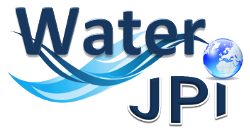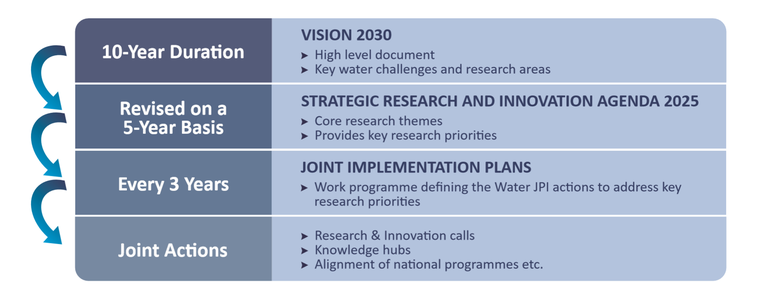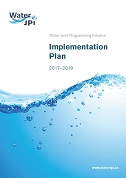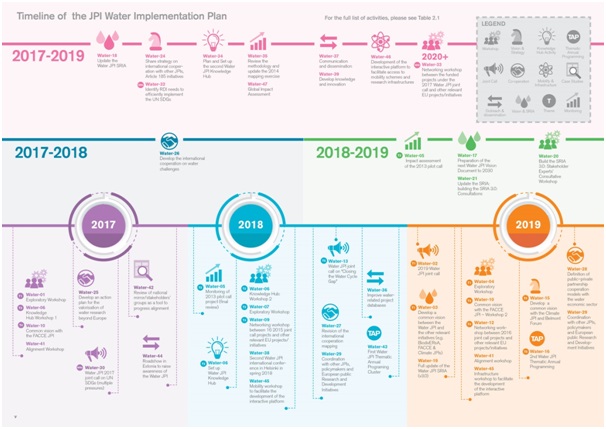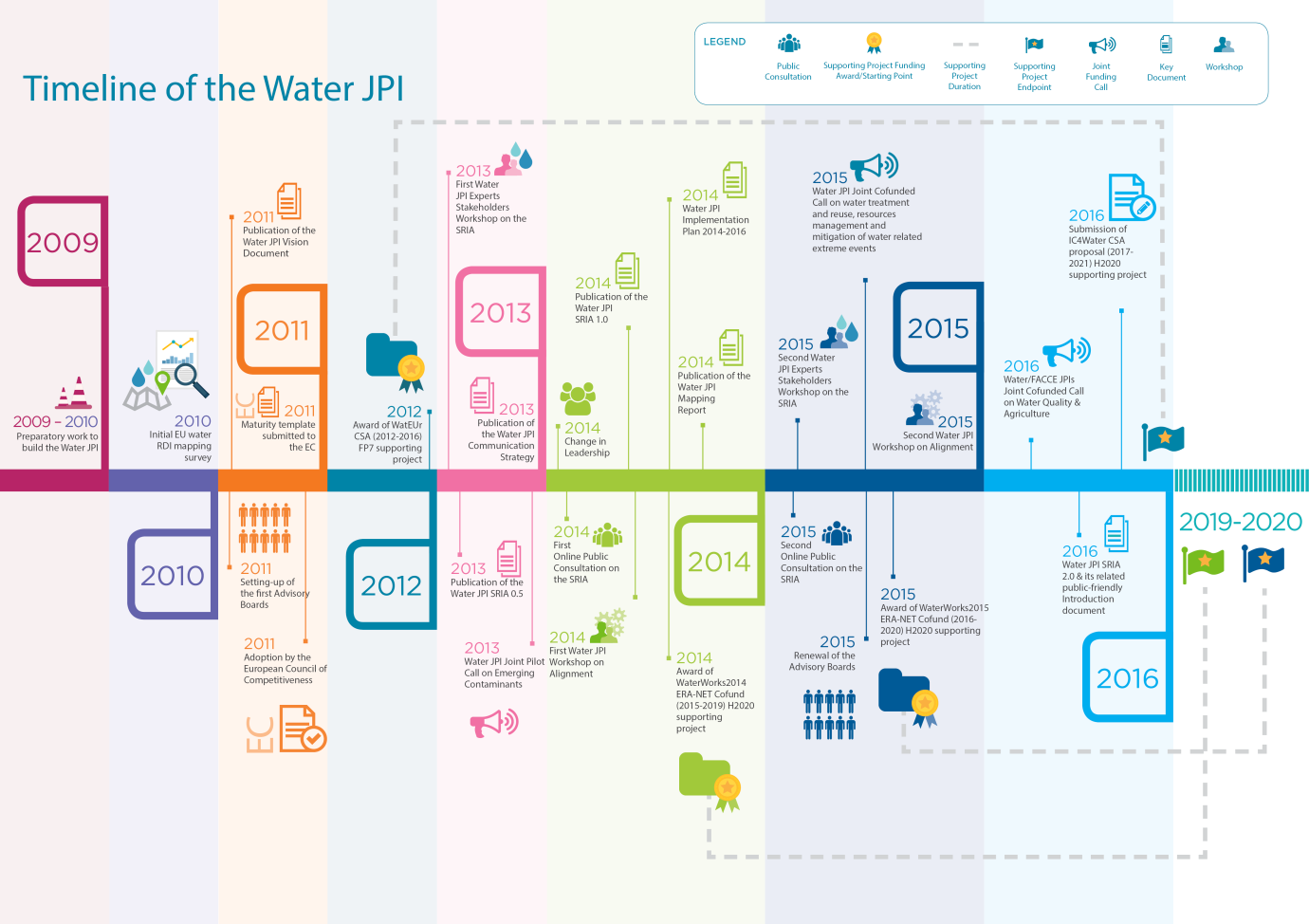Implementation
|
Update 23.06.2022 The Water JPI Impact Assessment Report is available here. |
The European Commission is encouraging Member States to work together on research into a range of topics that pose a challenge to European citizens now and in the years ahead, because European researchers can achieve more results and make better use of public funds through research cooperation and RDI programming coordination than by working separately. The Joint Programming Initiative on water works to get participating countries to coordinate their individual water research agendas with a European-wide strategic research agenda on common research questions to be solved. It will increase cooperation between European water professionals through sharing resources, building networks and involving all stakeholders in the development of its activities.
Both the Water JPI and Horizon 2020 use public funds to achieve their goals, and enjoy a significant area of synergy in their respective research priorities. These synergies can enhance knowledge and capacities in order to support national alignment of RDI activities. The JPI also provides a channel for dialogue with the EC on future Horizon 2020 calls. Since its launch, the EC has been very supportive of the Water JPI and a nonvoting member of its GB. In its 2013 Position Document on Horizon 2020, the Water JPI committed to sustain a permanent dialogue with Horizon 2020, focusing on issues such as:
- The implementation of synergy areas in water RDI
- Agenda setting within Horizon 2020
To facilitate this dialogue, the Water JPI has set up a Task Force dedicated to Interactions with the EC.
Vision 2030 and SRIA
The Water JPI Vision 2030, “Together for a Water-secure World”, outlines what the Water JPI aims to achieve during the next 10-year period (until 2030) and sets out the roadmap for all Water JPI activities taking into account the main trends, the key drivers and challenges in relation to our water resources.
The Vision 2030 will reinforce global leadership in water research and foster collaboration to achieve safe, clean and sustainably managed water resources for all.
It is first in the hierarchy of the Water JPI’s activities and provides the context for further activities (i.e. trends, drivers and challenges) in responding to the issues faced by Europe and increasingly at a global level.
Following the Vision document, the Water JPI also develops the Strategic Research and Innovation Agendas (SRIAs) which is updated in 5-year cycles.
The SRIA sets out specific RDI research themes, sub-themes and priorities and identifies areas where RDI actions are required. The identified research priorities are openly accessible to various stakeholders, such as researchers, regulatory agencies, policymakers, industry and the public.
The core research themes being addressed by the Water JPI in the SRIA 2025 are Ecosystems, Health and Wellbeing, Water Value and Usage and Sustainable Water Management. Each of the core themes will in turn form part of an Implementation Plan with descriptions of tasks and indicators.
Implementation Plan 2017-2019
In March 2017, the Water JPI published its Implementation Plan for the period 2017-2019. The purpose of the document is to guide the operations of the Water JPI.
In particular, the Implementation Plan:
- focuses on the development of the Water JPI;
- presents priority items that are to be implemented;
- permits planning ahead for agreed joint activities;
- lists specific goals for the three-year period; and
- outlines the efforts to be deployed
This Implementation Plan is organised into:
- Thematic activities, which are proposed activities implementing specific RDI needs of the Water JPI Strategic Research and Innovation Agenda (SRIA 2.0), consisting of:
- Water JPI activities; and
- Recommendations to other European Union funding programmes (section 3.6).
- Horizontal activities, which are proposed activities, not specific to a particular theme of the SRIA, but that instead progress principal JPI activities (e.g. update of the SRIA, mapping of RDI funding, international cooperation, outreach and dissemination, etc.).
Timeline of the proposed Water JPI Activities 2017-2019 – In Brief
Glossary of activities
Click here to view a short definition of the proposed activities
The WATER JPI Implementation for the period 2014-2016 focuses on activities classified into three types: interfacing with society, empowering research and innovation actors, improving the RDI programmes.
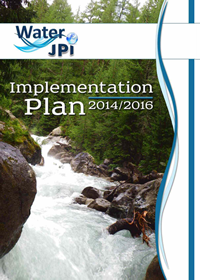 The WATER JPI Implementation Plan for the period 2014-2016 aims at implementing three
The WATER JPI Implementation Plan for the period 2014-2016 aims at implementing three
Calls for proposals on water research and innovation issues able to contribute to the alignment of the national and regional water RDI programmes, and to the development of the Strategic Research and Innovation Agenda.
To know more about our implementation activities read the interview with Enrique Playán and/or click here
A new Implementation Plan is under discussion for 2017 – 2019. It should be approved at the Vienna Governing Board meeting (29 November 2016).
The Water JPI Key achievements over the period 2011-2016 include:
- Progress towards alignment of national research agendas, which is a crucial priority enabling the optimal use of national research funds.
- Agreement on a common Vision Document, which outlines the objectives the Water JPI is aiming to achieve by 2020.
- The development of the Water JPI Strategic Research and Innovation Agenda (SRIA), which lays out specific RDI needs to tackle the Water JPI grand challenge.
- The extension of the Water JPI membership to build a greater critical mass, which is required to provide an effective response to major societal challenges and to strengthen the European Research Area.
- Establishment of the Water JPI Advisory Boards: Scientific and Technological Board (STB) and Stakeholder Advisory Group (SAG), to extend its partnership and involve multi-stakeholders.
- The development and consolidation of international cooperation, starting from the level of European countries and widening the reach of the JPI to tackle Research, Development and Innovation (RDI) needs at a more global scale. The first development actions targeted seven countries (Brazil, Canada, China, India, South Africa, United States and Vietnam).
- Strengthening the focused EU leadership regarding water RDI activities through publishing of several position papers, interacting with other EU initiatives, and creating synergies between them.
- Completion of a comprehensive EU water RDI mapping report, including the creation of a Projects Database to better understand the European water-related RDI activities and take stock of national and regional research strategies, policies and programmes in the EU.
- The launch of three Joint Calls for Proposals in 2013, 2015 and 2016 (under final stage of evaluation). So far, 23 projects have been funded, with a total budget of approx. €24.9 million.
- Establishment of a Dissemination Strategy since 2013, to implement and develop the Water JPI communication platform to reach different types of stakeholders and facilitate the engagement of the public at large.
![]() Read More: 2016 Water JPI Key Achievements document.
Read More: 2016 Water JPI Key Achievements document.
Timeline of the Water JPI
Glossary of activities
Click here to view a short definition of the proposed activities
